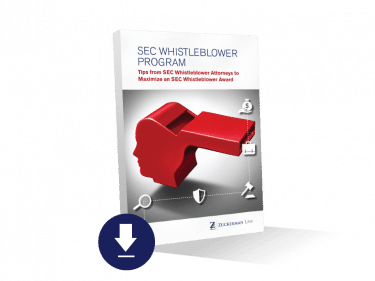SEC Whistleblower Protection

The SEC recently brought its first enforcement action ever to be based solely on retaliation against a whistleblower. On September 29, 2016, the SEC ordered International Game Technology (“IGT”) to pay a $500,000 penalty for terminating the employment of a whistleblower because he reported to senior management and to the SEC that the company’s financial statements might be distorted. See Exchange Act Release No. 78991 (Sept. 29, 2016). During an internal investigation into the whistleblower’s allegations, IGT removed him from opportunities that were integral to his ability to perform his job successfully. IGT then fired the whistleblower the same day as the internal investigation concluded that IGT’s cost-accounting model was appropriate and did not cause its financial statements to be distorted. The whistleblower was protected under the SEC whistleblower program, despite being mistaken, because he reasonably believed that IGT’s cost-accounting model constituted a violation of federal securities laws.
The action against IGT was the SEC’s first standalone retaliation case. However, it is consistent with a 2014 enforcement action that indicated, for the first time, that retaliating against a whistleblower can result not only in a private suit brought by the whistleblower but also in a unilateral SEC enforcement action. On June 16, 2014, the SEC announced that it was taking enforcement action against Paradigm Capital Management, Inc. (“Paradigm”), a hedge fund advisory firm, for engaging in prohibited principal transactions and for retaliating against the whistleblower who disclosed the unlawful trading activity to the SEC. See Exchange Act Release No. 72393 (June 16, 2014). This was the first case in which the SEC exercised its authority under Dodd-Frank to bring enforcement actions based on retaliation against whistleblowers.
According to the order, Paradigm retaliated against its head trader for disclosing, internally and to the SEC, prohibited principal transactions with an affiliated broker-dealer while trading on behalf of a hedge fund client. The transactions were a tax-avoidance strategy under which realized losses were used to offset the hedge fund’s realized gains.
When Paradigm learned that the head trader had disclosed the unlawful principal transactions to the SEC, it retaliated against him by removing him from his position as head trader, changing his job duties, placing him on administrative leave, and permitting him to return from administrative leave only in a compliance capacity, not as head trader. The whistleblower ultimately resigned his position.
Paradigm settled the SEC charges by consenting to the entry of an order finding that it violated the anti-retaliation provision of Dodd-Frank and committed other securities law violations; agreeing to pay more than $1 million to shareholders and to hire a compliance consultant to overhaul their internal procedures; and entering into a cease-and-desist order.
The SEC’s press release accompanying the order includes the following statement by Enforcement Director Andrew Ceresney: “Those who might consider punishing whistleblowers should realize that such retaliation, in any form, is unacceptable.” The Paradigm enforcement action suggests that whistleblower retaliation can result in liability far beyond the damages that a whistleblower can obtain in a retaliation action and that retaliation can invite or heighten SEC scrutiny.
Whistleblower Protections for SEC Whistleblowers Post-Digital Realty
Protections for SEC Whistleblowers Post-Digital Realty (11-6-2020)SEC Whistleblower Protection Lawyers

Drawing on our substantial experience representing corporate whistleblowers, we have published a free guide to SOX titled Sarbanes-Oxley Whistleblower Protection: Robust Protection for Corporate Whistleblowers:
For information about the SEC’s Whistleblower Reward Program, download our free ebook SEC Whistleblower Program: Tips from SEC Whistleblower Attorneys to Maximize an SEC Whistleblower Award.
The SEC whistleblower protection lawyers at Zuckerman Law have extensive experience representing corporate whistleblowers and have recovered more than fifteen million dollars for SOX whistleblowers. U.S. News and Best Lawyers® have named Zuckerman Law a Tier 1 firm in Litigation – Labor and Employment in the Washington DC metropolitan area in the 2018 edition “Best Law Firms.” In 2017, Washingtonian magazine named two of our attorneys top whistleblower lawyers.










